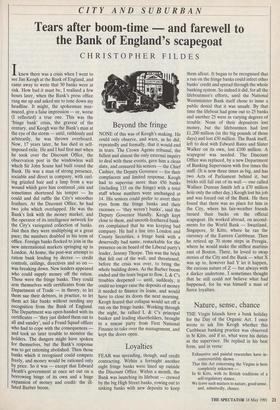Loyalties
FEAR was spreading, though, and credit contracting. Within a fortnight another eight fringe banks were lined up outside the Discount Office. Within a month, the Bank was launching its lifeboat — crewed by the big High Street banks, rowing out to sinking banks with new deposits to keep them afloat. It began to be recognised that a run on the fringe banks could infect other banks' credit and spread through the whole banking system. So indeed it did, for all the lifeboatmen's efforts, until the National Westminister Bank itself chose to issue a public denial that it was unsafe. By that time the lifeboat had gone out to 25 banks and another 25 were in varying degrees of trouble. None of their depositors lost money, but the lifeboatmen had lent £1,200 million (in the big pounds of those days) and lost £50 million. The Bank itself, left to deal with Edward Bates and Slater Walker on its own, lost £100 million. A scapegoat was needed. The Discciunt Office was replaced, by a new Department of Banking Supervision with five times the staff. (It is now three times as big, and has two Acts of Parliament behind it, but bricks still fall out of its wall — one called Wallace Duncan Smith left a £70 million hole only the other day.) Keogh lost his job and was forced out of the Bank. He then found that there was no place for him in the City, where his fair-weather friends turned their backs on the official scapegoat. He worked abroad, on second- ments for the World Bank — Swaziland, Singapore, St Kitts, where he ran the currency of the Eastern Caribbean. Then he retired up 70 stone steps in Perugia, where he would make the stiffest martinis east of Boston. There, he loved to swap stories of the City and the Bank — what X was up to, however had Y let it happen, the curious nature of Z — but always with a darker undertone. I sometimes thought that he still could not believe what had happened, for he was himself a man of fierce loyalties.


























































 Previous page
Previous page